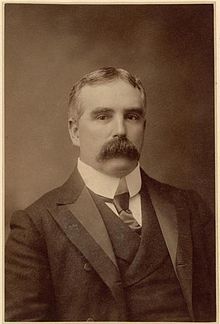Thomas Ewing (Australian politician)
|
The Honourable Sir Thomas Ewing KCMG |
|
|---|---|
 |
|
| Member of the Australian Parliament for Richmond |
|
|
In office 29 March 1901 – 19 February 1910 |
|
| Preceded by | New seat |
| Succeeded by | Walter Massy-Greene |
| Personal details | |
| Born |
9 October 1856 Pitt Town, New South Wales |
| Died | 15 September 1920 (aged 63) Darlinghurst, Sydney |
| Nationality | Australian |
| Political party | Protectionist Party |
| Spouse(s) | Margaret Russell McCabe |
| Relations |
Norman Ewing (brother) John Ewing (brother) |
| Occupation | Surveyor |
Sir Thomas Thomson Ewing KCMG (9 October 1856 – 15 September 1920) was an Australian politician.
Ewing was born at Pitt Town, New South Wales to clergyman Thomas Campbell Ewing and Elizabeth, née Thomson. Despite an intention to study for the Bar, he joined a surveyor's party at the age of 17, and became a licensed surveyor with the New South Wales Department of Lands in 1877. He married Margaret Russell MacCabe on 1 October 1879 at Wollongong, with whom he had three sons and two daughters, known as, Francis Peter Ewing born 1880, olive Margaret Ewing born in 1882, Thomas Campbell Ewing born in 1884, Helen M Ewing born in 1892, Colin Ewing born in 1894.
In 1885 Ewing left the Lands Department to stand, successfully, for the New South Wales Legislative Assembly, representing the seat of Richmond. Although he was a "theoretical" supporter of free trade, he became a supporter of moderate protectionism, and, while a supporter of female suffrage, was an opponent of non-European immigration. In 1894 he transferred to the seat of Lismore, and became known as an independently minded member. A popular member, he became involved in Sydney's hydro-electricity scheme, fiscal policy and Federation, where he was a supporter of Sir Henry Parkes, Sir George Dibbs and Sir Patrick Jennings.
Ewing moved to federal politics in 1901, entering the Australian House of Representatives as the Protectionist member for Richmond. In the second administration of Alfred Deakin he was Vice-President of the Executive Council (1905–06), Minister for Home Affairs (1906–07), and Minister for Defence (1907–08). A strong supporter of the White Australia Policy and of compulsory military training, Ewing organised a scheme for such compulsory training, which was the basis of the 1909 Defence Act. Ewing retired from politics in 1910 due to ill health, and began farming on the Tweed River.
...
Wikipedia
